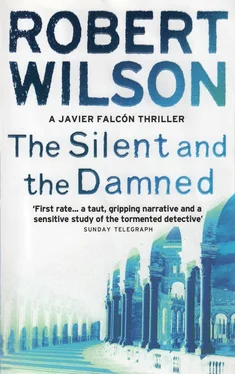'Yes, the crime scene,' said Calderón. 'That seems to be explicable in any number of ways. Suicide or murder, with between one and three people involved in the deaths. You have no suspects. There's not even the vaguest mention of a motive in any report. You have no witnesses. Sergei the gardener is still missing.'
'We're working on that. We have a photo ID and we know he was seen talking to a woman in a bar near the Vegas' house quite recently. We're also going door-to-door in Santa Clara and the Poligono San Pablo,' said Falcón. 'As far as motive goes, we're going to have to work hard on the Russian angle and -'
'Let's not get too excited about the Russians until we know who they are and we've seen the extent of their involvement from the accountant's reports. I know there's a lot of money-laundering going on in Marbella and places along the Costa del Sol, but so far all we've had here in Seville is a sighting by Pablo Ortega of a few Russians making a social visit seven months ago.'
'I was followed home on Wednesday night by a blue Seat with plates stolen in Marbella, and there's Russian and Ukrainian illegal labour on Vega's building sites,' said Falcón. 'There are enough questions over the state of the crime scene, the state of the body, the deceased's relationship with his son and potentially harmful outside influences to justify further inquiry.'
'OK, I take your point about the Russians. Let's try and work that up into something,' said Calderón. 'Sticking with the suicide angle for the moment, what about the boy?'
'Vega's domestic circumstances were not totally desperate. Even Sr Cabello, who has no love for his son-in-law, conceded that Vega was very fond of the boy,' said Falcón.
'He drank acid rather than shoot himself with a gun, which could indicate that he was punishing himself for unknown sins and protecting his son from possibly seeing a violent death. Maybe he killed himself precisely because there was something he couldn't bear his son to know about him,' said Calderón. 'If you had a son, Javier, what could you not bear him to know about you?'
'If he knew that I was a war criminal, I'd find it difficult to face him,' said Falcón. 'The difference between the war criminal and the murderer is that self-knowledge could be possible. Once history had moved on, the war criminal might see that he had been persuaded through a combination of political thought, national fervour and fear to have gone from being an ordinary man to becoming a merciless killer with a sense of duty to the regime and self-righteousness. Later in life, especially if he was being hunted down, he might reflect on what he'd done and feel a deep sense of shame. I could not imagine looking into my son's eyes and have him know that I was capable of such mercilessness.'
Silence. More smoking from the judge.
'We're doing what two law men should never do,' said Calderón.
'Back to business,' said Falcón. 'We found a false passport in one of Vega's freezers. It's Argentinian in the name of Emilio Cruz. We're checking that out and Rafael Vega's ID.'
Calderón nodded, crushed out his cigarette, lit another.
'Vázquez said that Vega's parents were "killed", implying they did not die of natural causes,' said Falcón. 'Who were they? What happened to them? That could be interesting.'
'For background, yes,' said Calderón.
'And there something else that's not in the report. I found a file in Vega's study entitled Justicia. Inside there were articles and downloads on criminal courts such as the ICC -'
'There's your war crimes, Javier.'
'- Baltasar Garzón and the Belgian justice system,' said Falcón. 'This is very specific material for someone in the construction industry, even if he did have an interest in current affairs. Put this together with the strange note in his hand at time of death and the false passport, and maybe we're looking at someone who had sensitive information which could do damage to people.'
'Both the Krugmans and Ortega mentioned some anti-American sentiment in their interviews,' said Calderón.
'It didn't seem to be as general as that. I think Vega's anger was more directed towards government. Marty Krugman even said he was pro-America.'
'Whatever, I only mentioned that because the US administration are against the ICC, which is directly related to the post 9/11 world, and there's Vega's weird note, as you said.'
'I read something about that in El Pais yesterday, but I didn't understand why.'
'The bland reason is that the US government doesn't want any of its citizens unfairly prosecuted,' said Calderón. 'The more piquant reason is that the world after 9/11 is in need of more policing. The cops are the US military. The Americans want to reserve the right to decide what's fair. They also don't want any member of the administration indicted for war crimes. They are the most powerful nation on Earth, they're exerting influence wherever they can. Plenty of people don't like their tactics – "If you don't support us, we'll cut military aid." But it's a complex world. Just as one person's freedom fighter is another's terrorist, so one person's fair military target is another's atrocity.'
'Then don't you think an interesting line of inquiry could be to look at why Vega had the remotest interest in the ICC and other judicial systems?'
'I don't know what he was expecting from it, because the ICC only came into being on 1st July this year and it can't look at crimes committed before that date. The Belgian justice system and Baltasar Garzón just means you've got to steer clear of Europe if you're worried about being indicted or arrested. So don't narrow your vision too much, Javier,' said Calderón. 'Keep concentrating on the details as well. Has any muriatic acid been found on the property?'
'Not yet. We haven't been able to fully search the property. My squad is spread all over the place trying to find Sergei as well as looking into Vega's business.'
'You know what I'm looking for: motive, suspect, reliable witness,' said Calderón. 'What I don't want to hear about are things that weren't there. If you don't find any muriatic acid it's only an indicator, it doesn't mean anything. No more… ghosts.'
Calderón did a passable imitation of a man drowning at his desk.
'This is why we don't like talking about our hunches in front of judges.'
'I'm being glib,' said Calderón. 'I know you're concentrated on the realities and the facts, but at the moment all we've got is nuance and hint – Russian mafia involvement, Vega's obsession with international courts, the Carvajal paedophile ring…'
'We haven't discussed that yet.'
'It's just names in an address book. Some of them are crossed out. There's no meat, Javier. There aren't even skeletons in here, they're just phantasms.'
'There you go again.'
'You know the meat I'm looking for and I'm not letting you launch a full murder investigation until I get it,' said Calderón. 'We'll reconvene for a case update early next week and if you still can't bring me anything that stands up in court then we'll have to move along.'
Calderón sat back, lit another cigarette – the man smoking more than Javier could remember – and became lost in his own thoughts.
'You wanted to see me alone,' said Javier, just to nudge Calderón out of his groove.
'Apart from not wanting Inspector Ramírez thumping me into submission -'
'He's more subdued these days,' said Falcón. 'His daughter's undergoing tests in the hospital.'
'Nothing serious, I hope,' said Calderón, on automatic, the news shooting past him while his mind wrestled with his own predicament. 'I didn't know that you and Inés were still in contact.'
'We're not,' said Falcón, who then gave an absurdly elaborate explanation of how he came to be in El Cairo with her.
Читать дальше
Конец ознакомительного отрывка
Купить книгу












